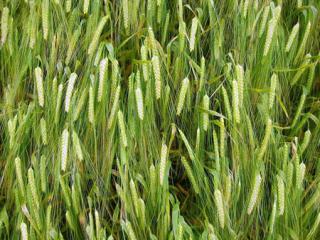Latest Briefing in Climate, water and energy

Integrated Disease Management in Spring Barley
Intergrated Disease Management (IDM) could help greatly reduce the volume of crops lost to disease in Scotland, contributing to our future food security. It works by integrating plant resistance, fungicides, cultural methods such as appropriate use of fertilisers, and newer, innovative approaches, to provide effective and sustainable disease control.
In Scotland, barley is the second most important crop after grass, with nearly 300,000 ha grown in 2012, with a net value of £315 million. Diseases represent a major constraint to barley production globally, despite considerable effort to control the pathogens responsible. The ability of pathogens to overcome host resistance, development of pathogen insensitivity to fungicides, and the increasing importance of pathogens thought previously to be of minor significance, means that diseases will continue to pose a threat to global barley production.
These constraints, coupled with increasing legislation aimed at protecting the environment, have led to increased efforts to find more sustainable approaches to disease control. Such approaches clearly need to balance protecting the crop from threats such as diseases, pests and weeds, with the need to minimise environmental damage, and requires an integrated approach to crop protection.
IDM represents such an approach and is a continuously improving process in which innovative solutions are integrated and adapted locally by growers. By offering a broad spectrum, integrated approach to disease control, IDM will contribute to reducing reliance on pesticides in agricultural systems.
Read morePublished on 16 December 2014 in Climate, water and energy , Ecosystems and biodiversity , Food, health and wellbeing
Recent Briefings in Climate, water and energy
Future disease threats to food crops - are we prepared?
Monitoring crops for new threats provides an early warning of emerging problems affecting food production & quality. Read more
Published on 18 October 2010 in Sustainability and Communities , Climate, water and energy , Ecosystems and biodiversity
Understanding public preferences for water management strategies in the context of climate change
Climate change is expected to cause major changes in precipitation patterns all over the world. Over the coming decades, this will heavily influence riverine water flows and availability of water resources. Read more
Published on 13 October 2010 in Climate, water and energy
Conservation Collections in Response to Global Plant Conservation Strategies
In response to Target 8 of the Global Strategy for Plant Conservation a project was initiated in the UK by the Botanic Garden community to encourage Botanic Gardens to grow plants from their own region to develop conservation collections. Read more
Published on 28 September 2010 in Climate, water and energy , Ecosystems and biodiversity
Reducing Greenhouse Gas Emissions: The Contribution of Animal Health
Published on 26 July 2010 in Climate, water and energy , Food, health and wellbeing
Reducing Greenhouse Gas Emissions In Scotland: The Contribution Of The Land Use Sector
Agriculture and the land use sector have an important role to play in the search for efficient means to tackle climate change. Read more
Published on 18 May 2010 in Climate, water and energy
Health Risks From Contamination Of Food And Water With Zoonotic Parasites
Cryptosporidium and Toxoplasma are two of the most important zoonotic parasitic infections worldwide. Read more
Published on 26 April 2010 in Sustainability and Communities , Climate, water and energy , Ecosystems and biodiversity , Food, health and wellbeing
Understanding Climate Effects On Woody Fruit Crops
The increasing variability of UK weather patterns can affect the performance of crop plants in both yield and quality. Read more
Published on 6 April 2010 in Climate, water and energy
Algae Diversity & Dispersal: Implications For Water Catchment Management And Conservation
Examination of universal dispersal hypothesis (UDH) and its application to microscopic algae and protozoa. Read more
Published on 29 March 2010 in Climate, water and energy , Ecosystems and biodiversity
Maintaining Low Levels Of Virus In The Scottish Seed Potato Crop
Keeping one step ahead of aphid vectors . Read more
Published on 17 March 2010 in Sustainability and Communities , Climate, water and energy
Breeding For Quality Improvements In Berry Fruit
90% of fruit consumed in the UK is imported. There is considerable scope for the continued expansion in UK soft fruit production as currently supply cannot meet demand. Read more
Published on 11 February 2010 in Sustainability and Communities , Climate, water and energy , Food, health and wellbeing







